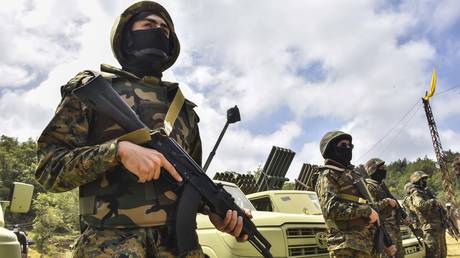ARTICLE AD BOX
PARANOID Vladimir Putin has covered the grave of rebel warlord Yevgeny Prigozhin with thick concrete.
The Wagner boss, 62, was killed when his private jet was blown out of the sky last August – allegedly on the tyrant’s orders.
 AP
AP East2West
East2West East2West
East2West East2West
East2West AP
APPutin’s pal-turned-foe had dented the dictator’s authority with a short-lived coup just two months earlier.
Speculation became rife that Prigozhin had been assassinated – with power-hungry Putin known to pick off his enemies as he pleases.
Now nine months on, the feared war chief’s grave has been enclosed with concrete fuelling rumours of a cover-up.
One Ukrainian Telegram channel joked: “So he can’t get out.”
Another said: “You won’t escape now.”
Despite being a “Hero of Russia”, Prigozhin was buried without fanfare in working-class Porokhovskoye cemetery, a large necropolis in St Petersburg.
Two months before his death, he was branded a “traitor” for staging a failed coup and ordering his rebel army to march on the Kremlin.
Ukraine’s GUR military intelligence has, however, refused to confirm that Prigozhin is dead – insisting there is no evidence beyond the word of Russian authorities.
The concrete roof to his tomb may stop later DNA analysis of his remains.
But it has been reported the concrete over his grave could be part of plans to erect a giant monument to him this summer.
Russian political analyst Dr Valery Solovey has claimed that Prigozhin was replaced on the ill-fated plane by his double.
He outrageously claimed Prigozhin is “alive and well” and living in the Caribbean – without offering a shred of evidence.
Solovey – a political scientist and former head of a leading institute in Moscow – claimed that the mercenary chief is hiding out in Venezuela.
Prigozhin is – apparently – reclining on the sunny island of Margarita – known for its beautiful beaches and stunning pearls.
“He is enjoying life at a very good resort,” said the so-called expert.
The 63-year-old – seen by some as a conspiracy theorist – was sacked from his prestigious job for “political reasons”
Other rumours claim Prigozhin is lying low in Cuba.
Prigozhin previously faked his own death and was declared dead in Africa in 2019 before re-emerging three days later.
Wagner troops played a key role in Putin’s war against Ukraine, but Prigozhin fell out with former defence minister Sergei Shoigu – who was ultimately fired by Putin this month.
Prigozhin blamed Shoigu for failing to supply sufficient munitions to Wagner forces.
Since Prigozhin’s death, Wagner has been largely wound up, with its fighters going to other private military forces, or the Russian army.
 AP
AP AP
APWho was Yevgeny Prigozhin?

YEVGENY Prigozhin rose through the ranks to control Russia’s mercenary army before dying in a fireball jet crash.
A former gangster, his rise to power seems to have a lot to do with hefty ambition and a murky past conducted in the backrooms of the Kremlin as he rode the waves of Putin’s favour all the way to the top.
One of Russia’s most powerful men before his death, he commanded a private army of more than 50,000 men stationed in Ukraine alone, and had a fortune thought to be in millions if not billions.
The paid killer group he founded back in 2014 acts as a de facto militia in some of Ukraine’s bloodiest battles and equals the strength of quarter of Russia’s entire army.
As Russia invaded Ukraine, Prigozhin stepped out of the shadows to wage war on Ukraine with his private military outlet, taking the leading role in the bloody battle for Bakhmut.
But his ruthless rise to the top began in 1981 in a courtroom in Leningrad, now-St Petersburg.
Old criminal documents revealed that Prigozhin was charged with robbery and assault and sent to the penal colonies of Soviet Russia.
As communism collapsed, he was freed after serving nine years. Hardened and opportunistic, he began flogging hot dogs on the streets of a crumbling St Petersburg.
This venture led to him opening a convenience store and eventually a chain of restaurants, whilst he dipped his hands in the organised crime ravaging the city.
By 1996, Prigozhin was running a hugely successful restaurant business that one fateful day Putin would dine at – earning the nickname “Putin’s chef”.
Soon after meeting President Putin in 2001, Prigozhin’s catering company began receiving lucrative state contracts to feed Russia’s schools and military.
It would turn out to be a billion ruble friendship – one of the many perks of proximity to Putin.
As his wealth amassed, so did his lavish lifestyle. He partied hard, bought a 121-foot yacht and bought property worth £105million.
When he wasn’t travelling in a private jet, he was personally organising Putin’s birthday parties.
Prigozhin’s lengthy CV also includes allegedly meddling in the US 2016 elections by bankrolling Russian propaganda-pumping troll farms.
For decades, Priogozhin was kept under the rug – not allowed to hold official positions so that he could carry out the Kremlin’s more criminal deeds.
But he went on to lead the 50,000-strong Wagner army, sort of back-alley army for hire that incredibly useful to Vlad during his brutal war.
Not only did he lend his men, but he also provided public support for the dictator’s gruelling campaign to take Ukraine.
He heavily criticised official Russian commanders who were suffering heavy losses in battle.
And the tirades against Putin’s army officials, along with the success of his own troops, won him many enemies.
But as the war continued and Prigozhin grew more powerful, his power made him dangerous.
Prigozhin’s coup attempt last June followed success on Nikolai Patrushev’s behalf to warn Putin off of the Wagner boss.
Putin had been ignoring the warlord, and the Kremlin was planning to remove his forces from Ukraine.
So Prigozhin marched unsuccessfully with 25,000 men and tanks straight from the Ukraine front lines into the southern Russian city of Rostov where a military HQ is based.
Although Alexander Lukashenko, president of Belarus, managed to broker a deal between Prigozhin and the Russian leaders, it seems the resulting peace did not run deep.
.png)
 6 months ago
5
6 months ago
5








 English (US)
English (US)